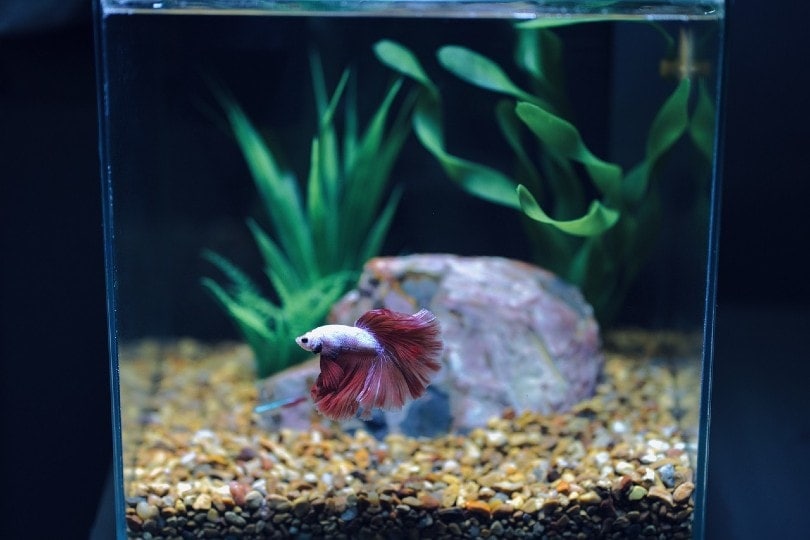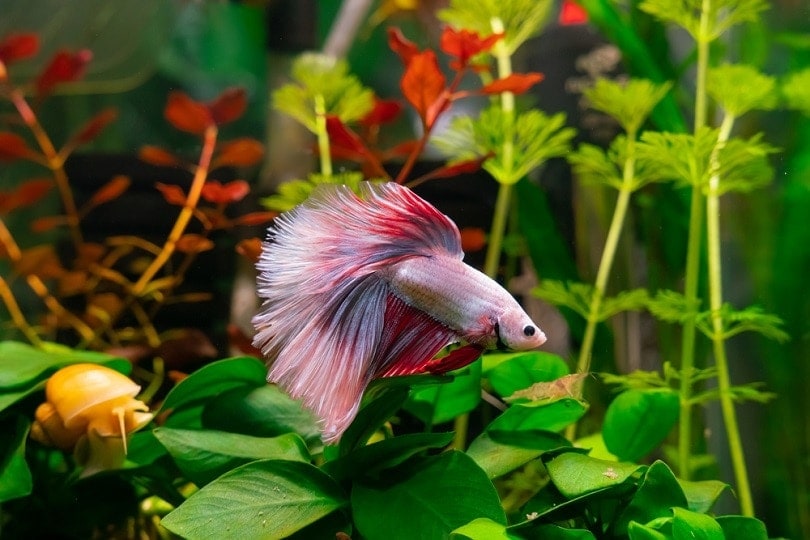Betta Tank Temperature: Vet Approved Care & Safety Tips

Updated on
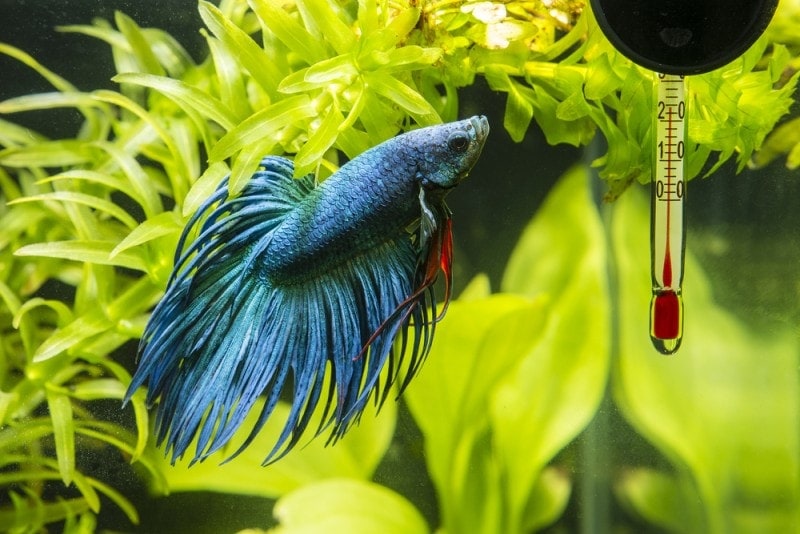
The betta fish (also known as the Siamese fighter) is a colorful and attractive-looking freshwater fish. They stay a relatively small size and can be housed in small tank environments starting from 5 gallons. Bettas are a great first pet and they can live up to 3 to 5 years if cared for properly.
Bettas are well-known for their hardiness and ability to temporarily tolerate less-than-ideal conditions. Although they are hardy enough to withstand minor mistakes a beginner fish keeper would make, you still want to ensure that your betta is looked after properly. This helps ensure the betta will be more comfortable and happier in their environment
If you are interested in keeping your betta healthy and active, this article is perfect for you!
Are Bettas Tropical or Cold-Water Fish?
Bettas are naturally tropical fish. They live in warm streams or rice paddies in the wild which can get up to 80°F to 90°F (26.7 – 32.2 °C) during the day. The temperature drops by a few degrees at night, but in small increments that do not pose a risk to the health of bettas.
The temperature in a betta fish tank should not fluctuate drastically as this can stress your betta out. This means a betta should have a pre-set heater in their tank to maintain a stable temperature between 80°F to 83°F (approximately 26.7 – 28 °C). This type of heater will turn on and off automatically depending on how much the temperature drops below the heating setting. If you enjoy watching bettas constructing nests, you should set the heater at 82.4°F (28°C). This is the ideal temperature for maintaining bubble nest integrity. Interestingly, this temperature also protects bettas against many pathogens that thrive in lower temperatures, such as gill flukes and Ich. It also dissuades the growth of certain bacteria.
Heaters are not an option for betta setups, it is an essential item that is necessary for their health and longevity.
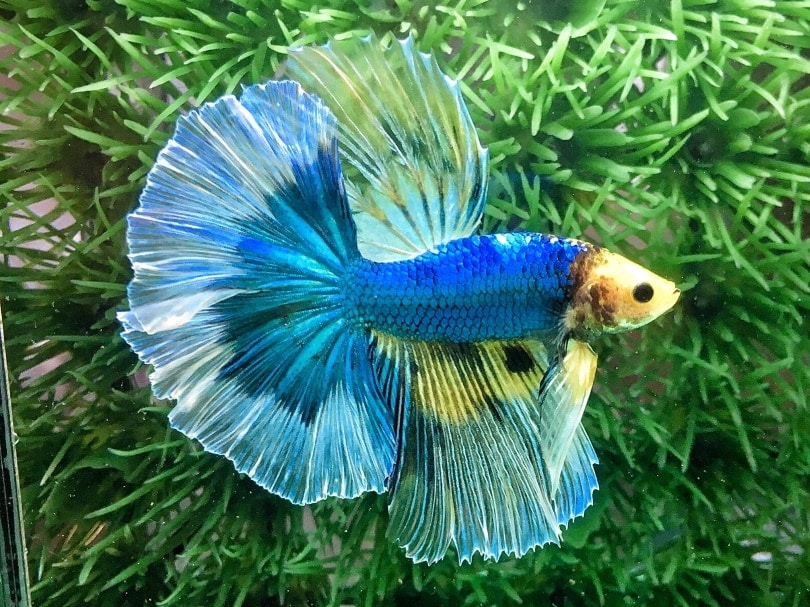
Is a Bowl or Tank Better for Temperature Control?
A tank is more ethical in comparison to a small bowl, bio-orb, or vase, which many beginner fish keepers use. These are not good long-term betta homes, and they will not allow you to place both a filter and heater inside, which can be detrimental to the well-being of bettas.
A simple 5-gallon tank is advised as a minimum for a single betta (male or female). Tanks are better than a bowl or vase would be. The temperature in small bodies of water causes the temperature within to become unstable. This results in the bowl or vase becoming too warm or too cold because the ambient room temperature can affect it even if you have a heater inside.
Bowls and vases also have too little surface area for proper gas exchange. This can cause your betta to breathe improperly and stay near the opening of the small aquarium to get some oxygen. Although bettas can use their labyrinth organ to hold oxygen much as a human lung would, they should still have sufficient oxygen to carry out basic behaviors. Warm water holds less oxygen than cold water does, which can become a problem in small spherical aquaria.
If you compare a betta living in a vase or bowl to one living in a tank, the activity levels are different. A betta that is kept in a heated 5-gallon tank with an air stone is significantly healthier than one kept in a small body of water. The activity levels are different as well, since the betta in a heated tank has more space to explore, and the heated water keeps them active and helps to maintain a healthy metabolism.
The Importance Of a Heater in a Betta Aquarium
Unstable temperatures can cause your betta to become uncomfortable, and they are more likely to fall ill. Many pathogens in aquarium water can affect a betta who is kept in cool conditions. This can be fungal or bacterial infections, like fin rot or tail rot.
Bettas require warm water to function normally. Cold conditions are not desirable for bettas and their body slows down as a result. Digestion and energy levels are mainly affected by cooler temperatures. When a betta is kept in cooler temperatures (mainly below 70°F), their metabolism slows down, and they will struggle to digest their food. If your betta cannot digest its food, it can lead to bloat and deficiencies.
Even if you feel that the ambient temperature is too warm for a heater to be necessary, you should still have a heater in the tank in case. This is because the ambient room temperature constantly changes. A heater will not turn on if the water is at the desired level, so you do not have to worry about overheating the water or wasting electricity. If the ambient room temperature drops, the heater will turn on to prevent the temperature of the water from changing. However, because fluctuating temperatures can sometimes result in unwanted algae blooms, an even better solution is to place your betta’s aquarium in a room that’s slightly cooler than the setting on your aquarium heater. This ensures that the heater keeps the temperature stable for your betta while also guaranteeing their water never becomes too warm.
Excluding a heater from your betta’s aquarium does not make it more natural, it instead creates an unsuitable environment that differs from their natural temperature requirements.
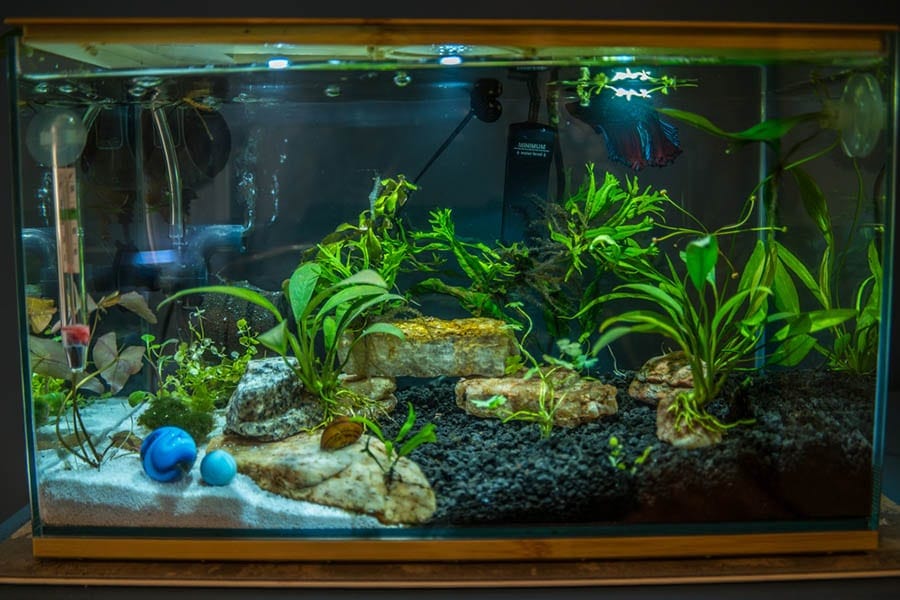
Where Should a Heater Be Placed in An Aquarium?
The heater should be placed near the outlet of the filter so that the heat can be evenly distributed throughout the tank. Do not place the filter in an enclosed area as the element can become overheated and either malfunction, shatter or break internally. If a decoration is placed near the heater, the warm water gets trapped and can damage the heater. Heaters can also melt or burn various decorations if they are touching the element.
The correct temperature for a betta fish is between 80°F to 83°F (approximately 27 – 28 °C), so ensure that the temperature of the heater is pre-set in between those two numbers. Many betta fish hobbyists have successfully housed bettas in temperatures slightly higher than this range with no issues.
The Pros and Cons of a Heater in a Betta Aquarium
There are plenty of benefits to having a heater in your betta’s tank. Not only is it an essential care item for them, but it keeps them healthy and lively which provides them with a better quality of life.
- Aids in proper digestion
- Keeps bettas comfortable
- Helps bettas fight diseases
- Encourages normal activity levels
- Enhances bettas colors
- Boosts appetite
- Helps the organs function normally
- The heater may malfunction
- Your betta could burn its fins
- The heater may be too large for small aquaria
- The element may shatter if it gets too hot
The pros outweigh the cons. Problems with heaters are usually down to the type of heater itself, and not the effects it has on a betta fish’s health. Poorly manufactured heaters can break easily, but nearly every type of heater can malfunction if it has not been used correctly, dropped, or if the element is broken. Nearly all these risks can be avoided by purchasing a good-quality heater from a reputable supplier or brand.
This adds another benefit to having your betta in a tank rather than spherical aquaria. If the heater does malfunction, a larger tank allows you to have a bit more time before noticing something may be wrong with the water temperature. If a heater malfunctions in a bowl or vase, the water may become overly hot or cold in a matter of minutes.
Please note that while heaters are an essential part of betta care and welfare, if you don’t have one and choose to add one to your betta’s tank, you should NOT change the water’s temperature by more than 1 or 2 °C (1.8 – 3.6 °F) per day. A sudden change may inadvertently shock and stress your fish. Gradual changes in temperature are advised for your betta’s safety. It is best to adjust the temperature by 1 °C (1.8 °F) every 12 hours until you reach the desired temperature.
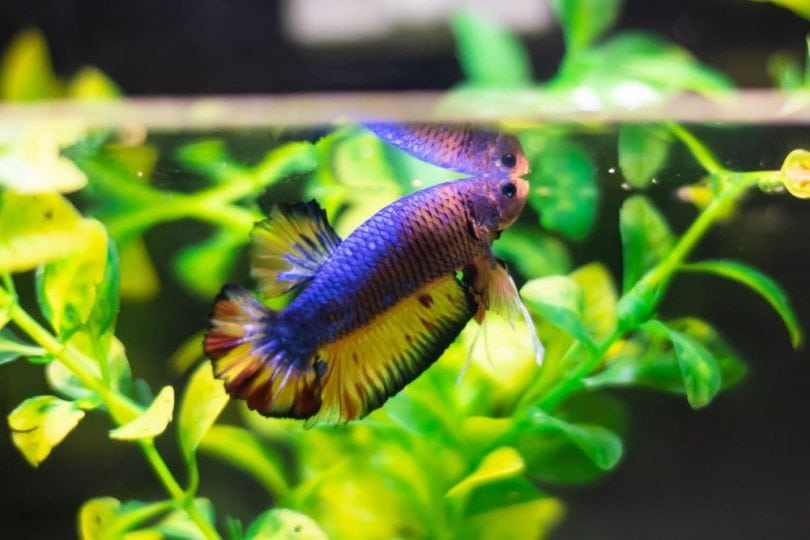
Helpful Products for Aquatic Temperature Monitoring
Choosing the right products to keep the temperature right for your betta is important. These products are recommended for both small and larger betta tanks. Because heaters are considered an essential item, including them in your betta’s overall setup is a must.
- 25W VIBRIT Smart Aquarium Heater – Perfect for 5-Gallon Tanks
- 50W Orlushy Aquarium Heater – Best for 5-10 Gallon Tanks
- 100W Orlushy Aquarium Heater – Best for 10-20 Gallon Tanks
- 10W DaToo Bowl and Vase Heater – Temporary Solution for Small Aquaria
- Zacro LCD Digital Thermometer
- Marina Increment Suction Cup Thermometer
- Emergency Aiicioo Reptile Heating Pad which can be placed on sides of tanks if a heater was to malfunction. Do not cover all sides of an aquarium with the heating pad.
Conclusion
Heaters are very important for betta fish, and every betta tank should have a heater inside. Ensure that you have an accurate thermometer to measure the temperature of the water. It may take a few days to find the right heating setting to get the desired water temperature. The tropical betta fish will show just how exploratory and active they are when they are kept at the right temperature.
Featured Image Credit: Lapis2380, Shutterstock



